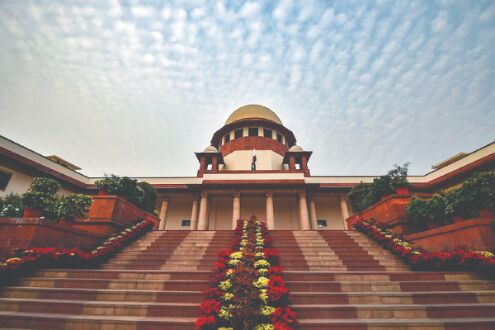Amicus to top court: Spl courts set up by SC to try lawmakers valid

New Delhi: Special courts for expeditious disposal of cases against sitting and former MPs and MLAs, set up by the Supreme Court under its special power, are valid and no illegality can be attached to trial of cases by these courts against lawmakers, the Supreme Court was informed on Tuesday.
The submissions were made before a bench headed by Chief Justice N V Ramana in a report by amicus curiae Vijay Hansaria and Sneha Kalita in response to vexatious legal issue whether minor offences, triable by magisterial courts, against lawmakers can be prosecuted before a special court presided over by a sessions judge who is senior to a judicial magistrate.
It has been alleged that such trials by sessions judge consequently lead to deprivation of one judicial forum for right to appeal which is ordinarily available to other accused.
The 34-page 15th report has been filed by the amicus curiae in a 2016 PIL filed by advocate Ashwini Upadhyay seeking a life ban on lawmakers convicted in heinous criminal cases and speedy disposal of cases against them and deals with the issue whether special court headed by an officer of the rank of Additional Sessions Judge can try cases which are triable by Magistrate under CrPC .
The report also deals with the question if a special court can try offenses without a committal order under CrPC and try cases without cognizance being taken by the magistrate under section 193 CrPC .
The constitution of Special Courts MP/ MLA for expeditious trial of cases against Parliamentarians and Legislators under the direction of this Court issued in exercise of power under Article 142 of the Constitution are valid and no illegality or unconstitutionality can be attached to trial of cases by these Courts against MPs/ MLAs.
All the accused persons are granted a fair trial as per the Constitutional norm. The cases are tried by judicial officers trained in law and no special procedure less advantageous to accused persons has been prescribed for trial of the cases. The cases are tried by the independent and qualified judges as per the procedure laid down in the Code of Criminal Procedure. MPs and MLAs constitute a separate class in themselves and expeditious trial of criminal cases against them by Special Courts do not suffer from any Constitutional infirmity, the report said.
Referring to apex court orders in setting up of special courts for trying 2G and Coal scam cases, the report said under a provision of the CrPC, the apex court has power to transfer a case from one court to another court of equal or superior jurisdiction .
"Similar power is possessed by the High Courts under section 407 CrPC. Thus, merely because a case has been transferred from a court of inferior jurisdiction to a court of superior jurisdiction, the same cannot be challenged as illegal, it said.
It is submitted that the constitution of Special Courts both at the Sessions level and the Magistrate level is desirable, and has been so recorded by this court in its earlier order, it said.
No illegality can be attached to the constitution of Special Courts for trial of both Sessions cases and Magisterial Trial cases, as the accused persons will get a fair trial before the said Court, it said.
The right of first appeal is not taken away, and instead of Session Court, the appeal would lie to the High Court. The right of revision is not an inherent right but only a supervisory jurisdiction, Hansaria said in the report.
The report said that the Allahabad High Court may be directed to constitute Special Court both at the Sessions level and Magistrate levels in all the districts.
Similar directions may be issued to all the High Courts and the State Governments to constitute Special Courts both at Sessions level and at Magistrate level in each district or group of districts as may be considered appropriate by the High Court having regard to the number of cases and geographical location, it said.
The report urged the bench to clarify that the directions to constitute special courts will not affect the orders passed by such courts at the sessions level in respect of cases triable by Magistrate under the CrPC.
The Magisterial trial cases already concluded or pending trial will not be open to challenge only on the ground that the final judgement and/or the interim orders have been passed by the Special Court headed by an officer of the rank of Sessions Judge, it said.
The special court manned by sessions judges shall transfer cases triable by magistrate to the special court presided over by the magistrate under the respective jurisdiction and the magistrate shall conduct the trial from the stage the file has been received, the report suggested.
On November 15, the apex court had said that jurisdiction of special courts has to conform to the statutes and there would be a very serious problem , if these courts decide
this aspect.



